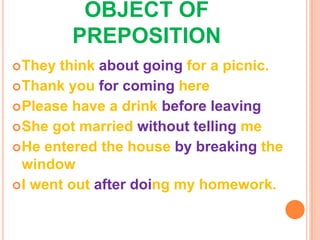

They are used as adjectives or to form verbs in a progressive tense. Present participles also end "-ing." Present participles are also verbals (i.e., words formed from verbs), but - unlike gerunds - they are not used as nouns. Not every word which ends "-ing" is a gerund.
Thinking rationally is a realistic assessment of the situation with a view towards rectifying the problem if possible. Discovery consists of seeing what everybody has seen and thinking what nobody has thought. Arithmetic is the ability to count up to twenty without taking off your shoes. 
(In these examples, the gerund phrases are shaded, and the gerunds are bold.) Here are some real-life examples of gerund phrases. These modifiers also make up part of the gerund phrase.
painting a fence with the brush his wife bought him. These complements (or objects) make up part of the gerund phrase. The direct object of a gerund is known as a gerund complement. For example:Ī gerund is not like a normal noun because a gerund can take a direct object (just like a verb can). The Parts of a Gerund PhraseĪll gerunds end "-ing." They are nouns formed from verbs. (The gerund phrase is a subject complement that completes the linking verb "was.") Her biggest mistake was caring too much about the quality of the product. (The gerund phrase is the object of the preposition "about.") She knew a lot about growing tomatoes in cold climates. (The gerund phrase is the direct object of the verb "hates.") (Here, the gerund phrase is the subject of the verb "is.") Eating blackberries quickly is a bad idea. Like all nouns, a gerund phrase can function as a subject, an object, or a complement within a sentence. In fact, "without washing them" is an adverbial phrase, which itself contains a gerund phrase ("washing them") consisting of a gerund ("washing") and its direct object ("them"). This is the same as the example above, except - this time - the modifier is the phrase "without washing them." Just like "quickly" in the first example, it is an adverb. Eating blackberries without washing them will make you ill. 
Now, let's make it a little more complicated: (The object of a gerund is also called the gerund complement.)
The word "blackberries" is the direct object of the gerund. (A gerund phrase always starts with the gerund.) Eating blackberries quickly will make you ill. 
Let's dissect two more gerund phrases and make things a little bit more complicated.
I want to talk to you about buying those magic beans. Try to serve the soup without dropping the tray this time. Removing the dressing quickly is the best way. Here are some easy examples of gerund phrases.








 0 kommentar(er)
0 kommentar(er)
